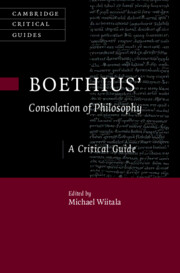Book contents
- Boethius’ Consolation of Philosophy
- Cambridge Critical Guides
- Boethius’ Consolation of Philosophy
- Copyright page
- Contents
- Contributors
- Abbreviations of Boethius’ Works
- Introduction
- Chapter 1 Boethius’ Philosophiae consolatio
- Chapter 2 The Ascent from Π to θ, or On Philosophy’s Teaching a Blind Man to See
- Chapter 3 Lady Philosophy as a Feminine Personification of Wisdom
- Chapter 4 Boethius’ Christianity in the Consolatio
- Chapter 5 The Blending of Pagan and Christian Elements in Book III of the Consolatio
- Chapter 6 The Human Person in the Consolation of Philosophy
- Chapter 7 Self-Investigation, Self-Knowledge, and Inner Conflict in Boethius’ Consolation of Philosophy
- Chapter 8 What It Means to Be a God
- Chapter 9 A Consolation through Philosophical Insight?
- Chapter 10 Being and Existence in the Consolation of Philosophy
- Chapter 11 Circle and Sphere Metaphors for God’s Nature and Providence in Boethius’ Consolation of Philosophy and Dionysius’ On Divine Names
- Chapter 12 Time and Eternity in the Consolation of Philosophy
- Chapter 13 Boethius on Human Freedom and Divine Foreknowledge
- References
- Index
- Cambridge Critical Guides
Chapter 6 - The Human Person in the Consolation of Philosophy
Published online by Cambridge University Press: 23 May 2024
- Boethius’ Consolation of Philosophy
- Cambridge Critical Guides
- Boethius’ Consolation of Philosophy
- Copyright page
- Contents
- Contributors
- Abbreviations of Boethius’ Works
- Introduction
- Chapter 1 Boethius’ Philosophiae consolatio
- Chapter 2 The Ascent from Π to θ, or On Philosophy’s Teaching a Blind Man to See
- Chapter 3 Lady Philosophy as a Feminine Personification of Wisdom
- Chapter 4 Boethius’ Christianity in the Consolatio
- Chapter 5 The Blending of Pagan and Christian Elements in Book III of the Consolatio
- Chapter 6 The Human Person in the Consolation of Philosophy
- Chapter 7 Self-Investigation, Self-Knowledge, and Inner Conflict in Boethius’ Consolation of Philosophy
- Chapter 8 What It Means to Be a God
- Chapter 9 A Consolation through Philosophical Insight?
- Chapter 10 Being and Existence in the Consolation of Philosophy
- Chapter 11 Circle and Sphere Metaphors for God’s Nature and Providence in Boethius’ Consolation of Philosophy and Dionysius’ On Divine Names
- Chapter 12 Time and Eternity in the Consolation of Philosophy
- Chapter 13 Boethius on Human Freedom and Divine Foreknowledge
- References
- Index
- Cambridge Critical Guides
Summary
The Consolation defends many claims about human nature and personhood, and depicts an exemplary human person, Boethius the character. This chapter synthesizes the book’s often puzzling and apparently divergent claims, while illustrating them with the depiction of the character of Boethius. It begins by outlining Boethius’ account of human powers and human nature, and then considers the Consolation’s account of human personhood. While Boethius’ account of personhood in the Consolation lacks the technical precision found in his Trinitarian works, he does give an account of some fundamental characteristics of persons consonant with his more explicit treatment in other texts. Finally, the chapter considers three distinctive themes in the Consolation’s account of human persons. First, this text controversially depicts human nature as able to change into that of a god or of a beast. Second, the Consolation depicts all human persons as microcosms, including within ourselves all aspects of the cosmos. Third, Boethius, like many classical writers, depicts human persons as most understandable in relation to beauty. Since this theme sums up earlier ones, the chapter closes there.
Keywords
- Type
- Chapter
- Information
- Boethius’ ‘Consolation of Philosophy’A Critical Guide, pp. 98 - 115Publisher: Cambridge University PressPrint publication year: 2024

